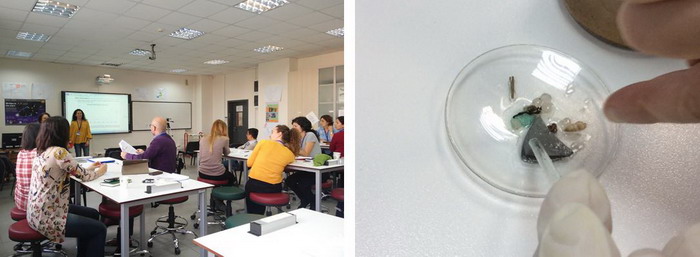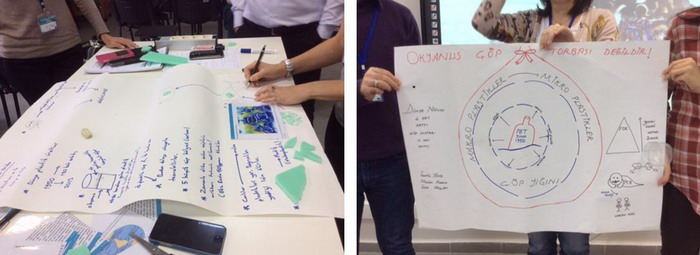The second phase of the Project Irresistible in Turkey has started with a workshop on “Nanotechnology Applications in Health Sciences” with the participation of 25 science teachers in 16-17 June 2015. The other two modules selected by the Turkish CoL included “Plastic-Bane of the Oceans” developed by IPN, Germany and “Adaptation to Climate Change” developed by Jyväskylä University-Finland. The “Plastic-Bane of the Oceans Module” was introduced to 12 science teachers at a workshop in November 8, 2015 at Bogazici University.
Teachers, at Plastic-Bane of the Oceans Workshop, experienced the module focusing on formation of plastic garbage patches as a result of release of tons of plastic waste into oceans each year, and the effects of these plastics breaking down into micro size on sea animals, human health, and environment. They were engaged in topic by watching two different broadcast news about plastic pollution in the sea surrounding Turkey and did a pre-discussion about what they know about plastics such as its synthesis and annual production. Secondly, they tried to solve a mystery about a family living in Greenland by using flashcards, and then prepared a poster on how they relate the information in flashcards with the mystery about the health of that family in a flow chart. Then, they examined the plastic pollution more in depth with a documentary about a research team’s expedition to the South Pacific Garbage Patch and the impacts of chemicals, released by plastics disintegrating into small pieces, on animals and environment. Science teachers involved in many discussions such as how plastics reach to oceans, what happens to plastics in the oceans, what the effects of these plastics are on earth ecosystem beside sea ecosystem, and the risks associated with plastics in the ocean. In addition, they analyzed different daily cosmetics and the sand sample from Kilyos Beach in Istanbul for the existence of plastics. They also phone called some water treatment institutions in Istanbul to ask whether they have a system to filter the micro size and smaller size plastics. They examined about the plastics in the oceans more in depth with two articles focusing around the macro and micro plastics and their impacts on sea animals. Finally, science teachers involved in a role playing game, which provided the opportunity to discuss whether to use micro-plastics in cosmetics or not from the perspectives of different stakeholders in society such as a politician from the Ministry of Health, a researcher, a biolog, and a representative from Environmental Control Association.


Responsible Research and Innovation, which was modeled based on 6E learning method, has attracted science teachers’ interest. Science teachers, doing a summative evaluation about the workshop, revealed that experiencing the module before implementing it in their schools had an important contribution in terms of having an idea about the possible needs of their students and their needs as a teacher, who would apply a module of a new topic with methods they are not used to.








